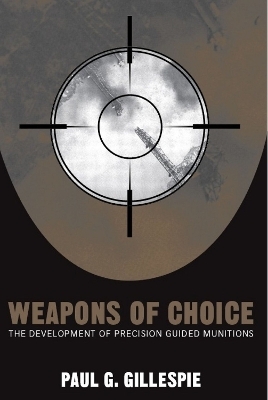
Weapons of Choice
The Development of Precision Guided Munitions
Seiten
2023
|
New edition
The University of Alabama Press (Verlag)
978-0-8173-5353-7 (ISBN)
The University of Alabama Press (Verlag)
978-0-8173-5353-7 (ISBN)
The prospect of pinpoint delivery of weapons right to the enemy’s door by speeding aircraft seems to presage war in which the messy and politically risky deployment of ground troops is unnecessary. This volume offers a history of the deployment of smart weapons.
History and deployment of smart weaponsIn the United States, efforts to develop precision guided munitions—PGMs—began during the First World War and resulted in an 'aerial torpedo' by the 1920s. While World War II was dominated by large-scale strategic bombing—essentially throwing out tons of free-falling munitions in the hope they hit something important—both sides in the war worked to develop airborne munitions that could be steered toward a target. However after that war, U.S. national security policy focused on the atomic bomb, hardly a weapon that needed to be directed with accuracy.
The cost of emphasis on atomic weapons was revealed in the general unsuitability of American tactics and weapons deployment systems during the Vietnam War. Lessons learned in that conflict, coupled with rapid technological developments in aerodynamics, lasers, and solid-state electronics, brought air power dramatically closer to the "surgical strike" now seen as crucial to modern warfare. New technology created attractive choices and options for American policymakers as well as field commanders, and events in the Arab-Israeli wars, the U.S. raid on Libya, and most dramatically in the first Gulf War created an ever-increasing demand for the precision weapons.
The prospect of pinpoint delivery of weapons right to the enemy's door by speeding aircraft seems to presage war in which the messy and politically risky deployment of ground troops is unnecessary. The potential of such weapons, and their strategic limitations, made the Gulf War and Iraqi War living theater for assessing what such weapons can and cannot do and have important implications for planning for future warfare.
History and deployment of smart weaponsIn the United States, efforts to develop precision guided munitions—PGMs—began during the First World War and resulted in an 'aerial torpedo' by the 1920s. While World War II was dominated by large-scale strategic bombing—essentially throwing out tons of free-falling munitions in the hope they hit something important—both sides in the war worked to develop airborne munitions that could be steered toward a target. However after that war, U.S. national security policy focused on the atomic bomb, hardly a weapon that needed to be directed with accuracy.
The cost of emphasis on atomic weapons was revealed in the general unsuitability of American tactics and weapons deployment systems during the Vietnam War. Lessons learned in that conflict, coupled with rapid technological developments in aerodynamics, lasers, and solid-state electronics, brought air power dramatically closer to the "surgical strike" now seen as crucial to modern warfare. New technology created attractive choices and options for American policymakers as well as field commanders, and events in the Arab-Israeli wars, the U.S. raid on Libya, and most dramatically in the first Gulf War created an ever-increasing demand for the precision weapons.
The prospect of pinpoint delivery of weapons right to the enemy's door by speeding aircraft seems to presage war in which the messy and politically risky deployment of ground troops is unnecessary. The potential of such weapons, and their strategic limitations, made the Gulf War and Iraqi War living theater for assessing what such weapons can and cannot do and have important implications for planning for future warfare.
Paul G. Gillespie is associate professor and Director of Military History at the US Air Force Academy in Colorado Springs and coeditor of Forged by Fire: Military History for the Profession of Arms. He has appeared several times as a consultant on the History Channel’s “Modern Marvels” series.
| Erscheint lt. Verlag | 7.2.2023 |
|---|---|
| Zusatzinfo | 20 B&W Figures |
| Verlagsort | Alabama |
| Sprache | englisch |
| Maße | 152 x 229 mm |
| Gewicht | 363 g |
| Themenwelt | Natur / Technik ► Fahrzeuge / Flugzeuge / Schiffe ► Militärfahrzeuge / -flugzeuge / -schiffe |
| Geschichte ► Teilgebiete der Geschichte ► Militärgeschichte | |
| Naturwissenschaften ► Biologie ► Ökologie / Naturschutz | |
| Sozialwissenschaften ► Politik / Verwaltung | |
| ISBN-10 | 0-8173-5353-4 / 0817353534 |
| ISBN-13 | 978-0-8173-5353-7 / 9780817353537 |
| Zustand | Neuware |
| Informationen gemäß Produktsicherheitsverordnung (GPSR) | |
| Haben Sie eine Frage zum Produkt? |
Mehr entdecken
aus dem Bereich
aus dem Bereich
colonial violence and new landscapes of resistance
Buch | Softcover (2024)
Pluto Press (Verlag)
28,65 €
how the Pentagon and Silicon Valley are transforming the future of …
Buch | Hardcover (2024)
Simon & Schuster (Verlag)
24,90 €


